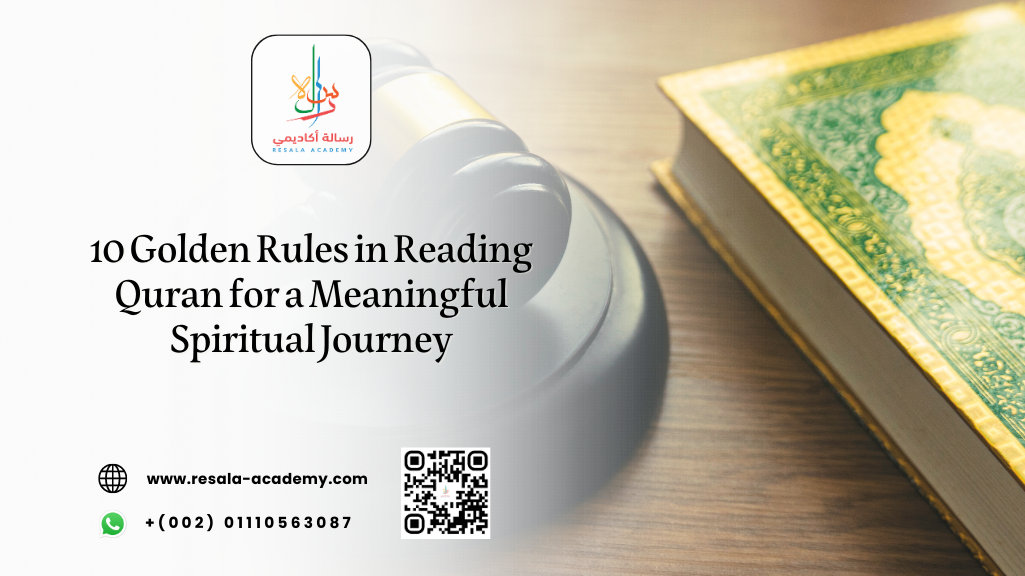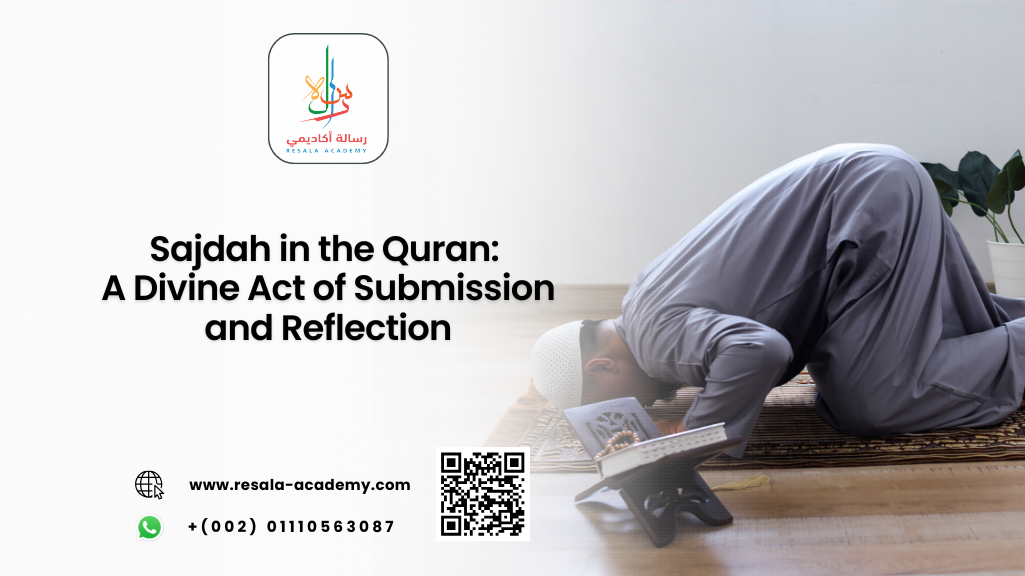Table of Contents
10 Golden Rules in Reading Quran for a Meaningful Spiritual Journey
Welcome to our blog post on the 10 Golden Rules in Reading Quran for a Meaningful Spiritual Journey! The Quran holds immense significance in the lives of Muslims around the world, serving as a guide and a source of inspiration. However, reading the Quran is not just about reciting words; it requires understanding and adhering to certain rules that enhance our connection with its profound teachings.
In this article, we will explore ten essential rules that can help you deepen your understanding and experience while reading the Quran. Whether you are a beginner or have been studying for years, these golden rules will provide valuable insights into how to approach this sacred text with reverence and mindfulness.
So let’s dive right in and discover the key principles that can transform your Quranic reading into a truly meaningful spiritual journey!
Want to Deepen Your Connection with Allah? Learn the Rules in Reading Quran
Do you yearn for a stronger connection with Allah? If so, the Quran is your ultimate guide. It holds within its sacred verses the keys to unlocking a profound spiritual journey. However, reading the Quran goes beyond mere recitation; it requires understanding and immersion in its teachings.
To embark on this transformative path, familiarize yourself with the rules of reading the Quran. These golden rules in reading Quran are designed to enhance your comprehension and bring you closer to Allah’s divine message. By adhering to these guidelines, you can elevate your experience from a simple reading exercise to a deeply meaningful encounter with God’s words.
One crucial rule is to approach the Quran with sincerity and humility. Recognize that every word has been divinely ordained by Allah Himself and treat each verse as a precious gem that holds immense wisdom. This mindset will help you connect on a deeper level, allowing the teachings of the Quran to penetrate your heart and soul.
Another vital rule is reciting with proper pronunciation (Tajweed). Tajweed ensures that each letter is enunciated correctly, preserving the integrity of Allah’s words. Seek guidance from qualified teachers or utilize online resources that offer Tajweed lessons; this practice will enrich your understanding and enable you to appreciate the intricate beauty of Arabic script.
Additionally, take time for reflection while reading the Quran. Pause after each verse or passage and contemplate its meaning in your own life. Consider how Allah’s guidance applies personally—allow His words to resonate within you and inspire positive change.
Furthermore, seek knowledge about Islam through reputable sources alongside reading the Quran itself. Understanding historical context, Prophet Muhammad’s (peace be upon him) life events, as well as scholarly interpretations can provide valuable insights into interpreting verses accurately.
Remember also not just read but strive towards applying what you learn from each session spent with His book! A practical application only deepens our connection further!
By following these golden rules in reading Quran diligently—approaching it with sincerity, reciting with proper pronunciation, reflecting on its meaning, and striving to apply its teachings—you can unlock a deeper spiritual connection with Allah and come to know His divine message more intimately.
Rule 1: The Conclusion of Verse
When reading the Quran, it is crucial to pay attention to the conclusion of each verse. This rule emphasizes the importance of pausing at the end of a verse before moving on to the next one. By doing so, we allow ourselves time to reflect on the meaning and absorb its message.
The conclusion of a verse serves as a natural break in the flow of recitation, creating space for contemplation. It allows us to internalize what we have just read and connect with its deeper significance. This pause also enables us to appreciate the beauty and eloquence inherent in every word of Allah’s divine revelation.
By observing this rule, we honor the rhythm and structure established within each verse. We allow ourselves to ponder over its lessons, delve into its wisdom, and grasp its intended impact on our hearts and minds. So remember, when reciting or studying the Quran, always pause after each verse – it will enhance your understanding and enrich your spiritual journey.
Let us now move on to explore another significant rule that can further enhance our experience while reading this timeless scripture!
Rule 2: The Compulsory Stop
In the beautiful art of Quran recitation, there are certain rules that one should follow to enhance their understanding and connection with the divine words. One such rule is the Compulsory Stop.
When you come across a verse in the Quran that ends with a sajdah mark or an ayah that requires prostration, it is mandatory to pause and perform sujood before continuing further. This act of prostration is a symbol of utmost respect and humility toward Allah’s words.
During this compulsory stop, take your time to reflect on the meaning behind the verse you just recited. Let its profound message sink into your heart and soul. Allow yourself to experience deep spirituality as you bow down in submission while pondering over the wisdom conveyed by those sacred words.
Remember, these moments of reflection during a compulsory stop can bring immense blessings upon us. Not only do they increase our knowledge but also instill a sense of devotion within us as we strive for spiritual growth through our Quranic journey.
So whenever you encounter a verse with a sajdah mark or an ayah requiring prostration, embrace this opportunity for introspection and connect with the divine presence within your heart.
Rule 3: The Absolute Pause
In the journey of reading the Quran, Rule 3 brings us to the concept of an absolute pause. This rule states that when you come across a verse with a “waqf mutlaq” sign, it is mandatory to stop completely without any continuation. It signifies a complete break in thought and requires reflection on what has been read.
The purpose of this rule is to allow for deeper contemplation and understanding of the verses. By pausing at these designated points, we give ourselves time to absorb the message and reflect on its significance in our lives.
This absolute pause also serves as a reminder that every word in the Quran carries immense weight and should not be taken lightly. It encourages us to delve into the meanings behind each verse, seeking guidance and wisdom from Allah.
By adhering to Rule 3 of the rules in reading Quran, we honor the sanctity of the Quranic text and engage in a more meaningful spiritual journey. So next time you encounter a “waqf mutlaq,” take that momentary pause, let it sink in, and allow your heart to connect with Allah’s words.
Rule 4: The Permissible Stop
When reading the Quran, we come across verses that allow for a permissible stop. This means that although it is not compulsory to pause at these points, one may do so if they choose. It gives flexibility and allows for contemplation or reflection on the meaning of the verse.
In some cases, pausing at a permissible stop can enhance our understanding and connection with the words of Allah. It provides an opportunity to ponder upon the message conveyed and derive personal insights from it. However, it’s important to note that this rule should be used sparingly as frequent pauses might disrupt the flow of recitation.
The permissible stop serves as a reminder that while continuity in reading is encouraged, there are moments when taking a pause can add depth and significance to our spiritual journey. By utilizing this rule judiciously, we can strike a balance between continuous recitation and thoughtful reflection during our study of the Quran.
Rule 5: Continue Reading
In our journey to understand the rules of reading the Quran, Rule 5 reminds us to keep the flow going. When we come across a verse without any punctuation marks or stops, it is important to continue reading without pausing abruptly. This rule applies when there are no obligatory stops or permissible pauses indicated.
Continuing with the recitation allows for a smooth and uninterrupted connection with Allah’s words. It helps maintain the rhythm and melody of the Quranic verses, enhancing our spiritual experience while reciting. By following this rule, we can dive deeper into the meaning of each verse as they unfold coherently.
The beauty lies in understanding that every word has its place and purpose within Allah’s divine message. As we continue reading, we allow ourselves to fully immerse in His guidance and absorb its profound wisdom. So let us embrace Rule 5 of rules in reading Quran as a reminder to flow with grace through each verse, creating an enriching spiritual experience along our journey of Quranic study.
Rule 6: The Licensed Pause
In our journey of reading the Quran, certain rules guide us toward a deeper understanding and connection with the divine words. One such rule is the licensed pause. This rule allows for a momentary break in recitation, but it should not be prolonged or unnecessary.
When encountering a verse where pausing seems appropriate due to its meaning or significance, this rule permits a brief pause before continuing. It provides an opportunity to reflect on the profound message conveyed by the verse. However, it’s crucial not to disrupt the flow of recitation or lose sight of continuity while taking this pause.
By incorporating licensed pauses into our reading, we can delve into the depths of each verse and absorb its wisdom more effectively. These moments allow us to contemplate upon Allah’s guidance and apply it to our lives. Remember, moderation is key when applying this rule; only take a brief pause if truly necessary and resume with focus and dedication.
The licensed pause acts as an invitation for introspection within our spiritual journey through Quranic verses. Let us embrace these opportunities mindfully as we seek enlightenment from His divine words.
Rule 7: Preference for Continuation
One of the important rules in reading the Quran is the preference for continuation. This rule emphasizes the importance of maintaining a smooth flow while reciting or reading the Quranic verses.
When we encounter words that are connected grammatically, it is preferred to continue without stopping. This helps to maintain the rhythm and coherence of the verses, allowing us to better understand their deeper meanings.
By following this rule, we can appreciate how each verse connects with those before and after it, enhancing our comprehension and spiritual experience. It also ensures that we do not disrupt the intended message conveyed by Allah through His divine words.
In practicing this rule, we develop a more intimate connection with the Quran as a whole rather than viewing individual verses in isolation. It allows us to immerse ourselves fully in its teachings and obtain a comprehensive understanding of its wisdom.
Rule 8: Better not to Stop
When it comes to reading the Quran, certain rules can enhance our understanding and spiritual journey. One such rule is “Better not to Stop.” This rule suggests that it is preferable to refrain from stopping at the end of a verse unless necessary.
By avoiding unnecessary stops, we maintain the flow and rhythm of our recitation. It allows us to grasp the overall meaning and context of the verses more effectively. Stopping abruptly may disrupt the intended message or break the connection between related ideas within a passage.
Moreover, by continuing without pause, we immerse ourselves in a continuous stream of divine guidance. We absorb each verse as part of a larger picture rather than isolating them individually. This approach enables us to appreciate the deeper insights and themes conveyed throughout different sections of the Quran.
Therefore, when reading Quranic verses, let’s strive for uninterrupted recitation whenever possible. By doing so, we open ourselves up to a more profound experience with Allah’s words and embark on an enriching spiritual journey through this sacred text.
Rule 9: The Permissible Pause
In the journey of reading the Quran, Rule 9 states that there are certain points where pausing is permissible. These pauses can help us better understand and reflect upon the verses we are reciting.
When encountering a permissible pause, it is important to take a moment to ponder over the message being conveyed. This allows for deeper contemplation and connection with the words of Allah.
A permissible pause can occur at the end of an ayah or verse, allowing time for reflection before continuing. It can also be taken after completing one page or chapter, providing an opportunity to absorb what has been read thus far.
By incorporating this rule into our reading practice, we give ourselves space to fully grasp and internalize the teachings of the Quran. Taking these moments of pause enables us to savor every word and apply its wisdom in our lives.
Remember, reading the Quran is not simply about finishing pages but rather embarking on a meaningful spiritual journey. Embrace these permissible pauses as opportunities for growth and enlightenment on your path toward understanding Allah’s guidance.
Rule 10: The Anticipation Mark
Anticipation is a key element in reading the Quran. It involves preparing oneself mentally and spiritually for what lies ahead. To facilitate this, scholars have introduced the concept of “Anticipation Marks” in the Quranic text.
An Anticipation Mark is a small symbol or sign that alerts the reader to anticipate a particular rule or pronunciation when reciting certain verses. These marks can indicate elongation (madd), silent pauses (sukun), or other rules of tajweed.
By paying attention to these anticipation marks, readers can enhance their understanding and connection with the words of Allah. They serve as reminders to slow down, reflect, and pronounce each word correctly.
While not every edition of the Quran includes anticipation marks, they are widely used in many popular editions and can greatly assist readers in their journey toward meaningful spiritual enlightenment through recitation. So next time you open your copy of the Quran, keep an eye out for those little symbols that hold great significance!
Resala Academy Offers Online Quran Classes
Resala Academy is dedicated to providing convenient and accessible Quran education through its online classes. With the advancement of technology, learning the Quran has become easier for individuals from all walks of life.
At Resala Academy, students have the opportunity to learn from qualified and experienced teachers who are well-versed in Islamic studies. The online classes are designed to cater to both children and adults, ensuring that everyone can embark on a meaningful spiritual journey at their own pace.
The academy offers a range of courses including Tajweed (proper recitation), Tafsir (interpretation), and memorization of the Quran. Students can choose from flexible class timings that suit their schedules, allowing them to balance their daily commitments while gaining knowledge and understanding of the holy book.
Enrolling in online Quran classes at Resala Academy not only provides convenience but also ensures a comprehensive curriculum delivered with excellence. Whether you are a beginner or wish to enhance your existing knowledge, these classes offer an enriching experience with personalized attention from qualified instructors. Start your journey towards deepening your connection with Allah’s words by joining Resala Academy today!
FAQs
1. Can I read the Quran without understanding Arabic?
Absolutely! Many people around the world read and benefit from reciting the Quran even if they don’t understand Arabic. The beauty of this sacred text lies in its ability to touch hearts and souls, regardless of language barriers. However, it is always recommended to learn Arabic or seek guidance from a qualified teacher to gain a deeper understanding.
2. How can I improve my Tajweed (pronunciation) while reading the Quran?
Improving your Tajweed requires practice and guidance. One effective way is by joining an online Quran class at Resala Academy, where experienced teachers will help you perfect your pronunciation through personalized feedback and lessons on the correct articulation of letters, vowels, and other rules of Tajweed.
3. Is it necessary to memorize the entire Quran for spiritual growth?
Memorizing the entire Quran is not obligatory for every Muslim but highly encouraged as it brings immense spiritual benefits. Memorization allows you to internalize Allah’s words deeply, facilitating reflection and connection with Him during prayers or moments of solitude.
Remember that these are just a few common FAQs about reading the Quran. If you have more questions or need further clarification on any aspects of studying this divine book, don’t hesitate to reach out!
Conclusion
Reading the Quran is not just about reciting words; it is a spiritual journey that requires understanding and contemplation. By following these ten golden rules in reading the Quran, you can enhance your experience and deepen your connection with Allah.
Remember to always conclude each verse properly, respecting its meaning and maintaining its integrity. Utilize compulsory stops when necessary to ensure clarity and comprehension. Use absolute pauses sparingly but effectively, allowing for reflection and understanding.
Permissible stops are useful for taking breaths or pausing briefly without disrupting the flow of the verses. However, do not let them hinder your overall comprehension of the text. Sometimes, it’s better to continue reading without any pause at all, especially if stopping may confuse or disrupt the intended message.
Licensed pauses offer opportunities for deeper reflection on certain verses or concepts before moving forward. However, be mindful not to overuse them as it may impede continuity in understanding.
When given a choice between continuing or pausing after a verse, preference should be given to continuation unless there is a specific reason otherwise. This helps maintain fluidity and allows for better connectivity between verses.
In general, try to avoid unnecessary stops whenever possible as they may break the rhythm of reading and hinder full immersion into this profound spiritual journey.
However, do note that permissible pauses have their place too – they can allow for brief moments of rest while still preserving coherence within a passage or concept being conveyed.
Pay attention to anticipation marks within the Quranic text as they provide valuable guidance on how certain phrases should be understood or interpreted ahead of time.
By adhering to these ten golden rules in reading the Quran during your personal study sessions or online classes through platforms like Resala Academy where you can learn from qualified teachers who specialize in teaching Tajweed rules alongside Islamic studies – you will embark on an enriching spiritual journey unlike any other!




